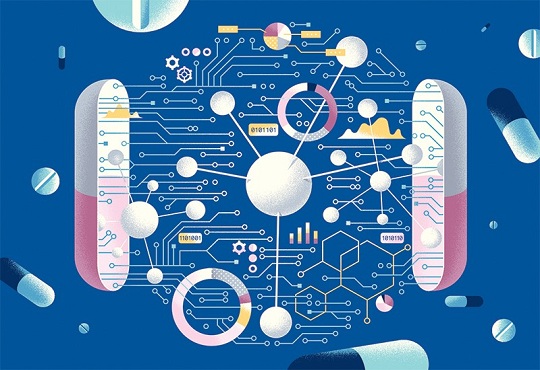How Artificial Intelligence is transforming the Pharma Industry
Abhrasnata Das | Wednesday, 16 February 2022, 04:17 IST

With growing time the pharmaceutical market has developed into a fiercely competitive market space. Today, the big pharmaceutical companies are actively leveraging AI to improve decision-making, optimize innovation, improve efficiency of research/clinical trials, and create beneficial new tools for physicians, consumers, insurers, and regulators.
Top pharmaceutical companies like Pfizer, AstraZeneca, Johnson & Johnson, and more have already acquired AI technologies. An effective implementation of AI can elevate the core workflows procedure, but the pharma companies can also make all business operations efficient, cost-effective, and hassle-free.
In this article let's find out how the pharma industry is leveraging Artificial Intelligence in their overall operations to ensure maximum output.
Drug Development
With the advent of artificial intelligence, the total procedure has shifted towards a more predictive analysis; thereby helping the pharma companies to approach in a more knowledgeable path which in turn considerably reduces the time taken to manufacture a drug and the overall cost.
Today the pharmaceutical firms actively leverage AI in the total procedure of Quality control, material waste reduction, improved production reuse, predictive maintenance, and more. Further, Machine learning can assist in forecasting and preventing over- and under-demand, as well as resolving supply chain issues and production line breakdowns.
Diagnosis
The use of AI and machine learning in the pharmaceutical sector has simplified the process of gathering, processing, and analyzing massive amounts of patient data. Physicians now use ML technology to record patients' symptoms, diagnostic tests, historical data, and other data securely in the cloud or a centralized storage system.
Doctors can use these data if they need to know how a certain genetic characteristic affects a patient's health or how a specific medicine can treat a health problem. Data from EMRs may be used by machine learning algorithms to generate real-time diagnoses and therapy recommendations to patients.
AI and Machine learning have greatly elevated the procedure of storing, accessing and interpreting huge data.
Remote Sensors
In the pharmaceutical and healthcare industries, remote monitoring is a game changer. Many pharmaceutical firms have already created wearables that use AI algorithms to monitor patients with life-threatening conditions remotely.
Tencent Holdings, for example, has partnered with Medopad to create AI technology that can remotely monitor Parkinson's disease patients and cut the time it takes to do a motor function evaluation from 30 minutes to three minutes. It is feasible to watch the opening and shutting actions of a patient's hands from a distance by combining AI technology with smartphone apps.
On detecting hand movement, the smartphone camera will capture it to determine the severity of the symptoms. The frequency and amplitude of the movement will determine the severity score of the patient’s condition, thereby allowing doctors to change the drugs as well as the drug doses remotely.
Today, some of the remote patient monitoring platforms help to identify many life threatening situations like brain bleeding on a CT scan or recognized abnormal heart rhythms on an Apple Watch.
Mobile apps with health measuring and remote monitoring features can assist AI to improve the medical treatment process. The applications' tailored data can also deliver valuable support in the research and development as well as therapy efficacy.
Manufacturing
Today many Pharmaceutical businesses use AI in their manufacturing processes to boost productivity, efficiency, and speed up the creation of life-saving pharmaceuticals. Quality control, predictive maintenance, waste reduction, design optimization, and process automation are all areas where AI may be utilized to monitor and optimize the manufacturing process.
Artificial intelligence (AI) can further help the pharma businesses to launch pharmaceuticals faster and at lower costs by replacing time-consuming traditional production procedures. AI would not only significantly increase their ROI by reducing human interaction in the production process, but it would also remove any potential for human mistake.
Marketing
With the promotion and sale of the end product being critical for any business, the use of artificial intelligence (AI) in the pharmaceutical sector to improve marketing has opened up new possibilities. Today, AI can assist in the mapping of the customer journey, allowing businesses to identify which marketing tactics brought people to their site and eventually drove converted visitors to make a purchase.
Pharma businesses may therefore concentrate their efforts on the marketing methods that result in the highest conversions and revenue growth.
To sum up
Accounting for the huge range of possibilities that AL and Machine Learning can bring for the pharma industry, the surge in deployment of AL in the pharmaceutical industry shows no signs of slowing down. To cite a recent study, it is anticipated that about 50% of the global pharmaceutical companies will implement AI strategy by 2025.
In the coming days, AI and machine learning will continue to aid medicine development and production. And, as AI technologies become more widely available, they will become a natural component of the pharmaceutical and industrial processes.
























































.jpg)
.jpg)








.jpg)

.jpg)

.jpg)
.jpg)



.jpg)


.jpg)





























.jpg)

.jpg)
.jpg)

.jpg)
.jpg)

































.jpg)

.jpg)



















.jpg)
















.jpg)












































































































